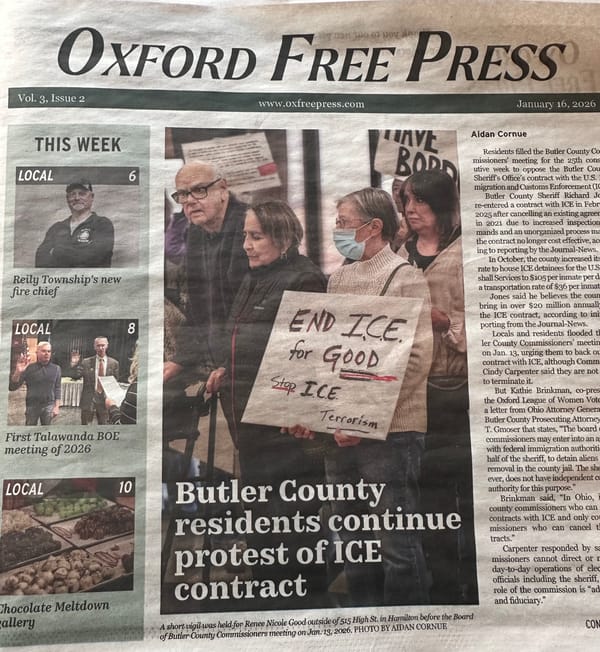Kirk memorial accelerates rise of Christian Nationalism
But why?
But why?
I listened with horror to some of the speeches at the memorial service honoring the fallen right-wing organized Charlie Kirk. As a child of evangelicals, I heard the coded language. I knew the bands that played. I recognized the music. I noticed how scripture was misquoted.
For years scholars and analysts have warned about a rising Christian nationalism in this country, and the memorial service appears designed to accelerate this trend. But why? What is the work that such an ideology would do for the Trump administration?
Evangelical coding
The entire service had the feeling of an evangelical church service. Benny Johnson asked, "Who feels the Holy Spirit in the house tonight?" and called for "that godly mission of wielding the sword against evil," language that any evangelical would recognize from years of attendance at weekly services. Pete Hegseth, the Secretary of Defense, suggested "On this Sunday morning, I’d like to think we’re all in Charlie’s church."
Hegseth went on to invoke a number of images that evangelicals will recognize: "Charlie Kirk was a citizen who had the biblical heart of a soldier of the faith, who put on every single day (1) the full armor of God with a smile as the Scriptures tell all Christ followers to do. Charlie Kirk a warrior for country, a warrior for Christ. (2) He ran the race. He finished the fight.”
While it is normal to expect religious imagery in any funeral or memorial service, the imagery that was employed in the Kirk memorial was not the standard language used in Christian burial rituals. Rather, it evoked Charlie as a martyr, setting him up as a Christ-like figure or prophet.
Jack Posobiec explicitly compared Charlie to Moses: "he looked across the river Jordan and he saw the promised land. he led the people there, but he did not cross himself... On his last day he led us there, and Charlie Kirk has brought us to the Promised land." Another speaker referred to Charlie's "sacrifice," an image that is meant to give him a Christ-like status.
It's important to remember that Charlie was not a religious figure. He was a political organizer who ran an organization that encouraged right-wing students to be more vocal in their defense of their beliefs. Suggesting that he is a prophet guiding the right into the promised land continues the trend of setting him up as a figure who is above repute. The same evangelicals who rail against an infallible Pope in Catholicism set up one of their own as above reproach and use the full force of the state to eliminate any interruption of his hagiography.
Beyond the religious rhetoric, the service was rife with absurd hyperbole. One speaker asserted that Charlie's organization Turning Point USA "will last forever." Why make such claims about an organization for college students? What was really being discussed here?
The evil "they"
The service continued the trend of vilifying the political left. As Robert Draper, the New York Times reporter who covered the event, so cogently summarized, "the third person plural was frequently invoked by the right." What he means is that participants in the rally kept using the word "they." But why is they? Kirk's killer is believed to have been a lone wolf - acting alone and not a part of a broader movement. Nevertheless, participants claimed repeatedly that "they" are responsible for his death. Who is they?
Tulsi Gabbard, the Director of National intelligence, illustrates the trend. She said, "They kill and terrorize their opponents hoping to silence them." That Gabbard spoke at all at a memorial for a political organizer should be an outrage to every citizen. The Director of National Intelligence is often the most feared position in any authoritarian regime, for it is one of the primary vehicles through which political dissidents are monitored and silenced. That her participation goes without notice shows the extent to which Americans do not understand the traditional workings of authoritarian regimes and how much they already live in one.
The President's son continued the discussion of "they" by identifying who is with MAGA and who is not. "If you believe in God and family and country, you are one of us," he asserted, clearly implying that "they" are those who do not believe in these things. By choosing banal and broad concepts that many embrace, the umbrella appears to be a broad one. But which God do you have to believe in to be one of them? And which country? These words are all euphemisms for relatively narrow categories which are designed to exclude those who question, critique, explore or dissent from a narrow vision of America that the right wing embraces.
The Vice President took things a step further, asserting that, "evil still walks among us. Not to ignore it for the sake of a fake kumbaya moment, but to address it head-on and honestly as the sickness that it is." His comments imply that a broad swath of Americans are responsible for the actions of Kirk's killer, and will be held responsible for his actions.
As a scholar of political violence I recognized the language. The language of "evil" is often used to describe acts of political violence as a way of ignoring the grievances that motivated those acts. We saw this in the months after 9/11 in which the president asserted that "they" "hate us and our freedom," rather than deal with the very specific grievances that Osama bin Laden had laid out - the presence of US troops in Saudi Arabia, US support for the state of Israel, and US responsibility for injustices across the Middle East. This trend has been observed for more than fifty years, and the literature is full of examples of leaders presenting people who participate in acts of political violence as bloodthirsty and evil. It is reasonable to refuse to allow people who engage in political violence to set the tone of any national debate, but to insist that they are evil rather than rationale actors is not supported by the data. Whether we like it or not, people sometimes do choose political violence as a way to express a grievance. While we may abhor their tactics, asserting that they are irrational does not lead to fewer acts of political violence.
Who is responsible for all of this "evil?" In the words of our president, "the left, the radical left, the radical left lunatics." He went further, claiming "the violence comes largely from the left," a claim that is easily debunked by reference to any political violence dataset.
Why this commitment to Christian nationalism?
We all know Donald Trump is not a Christian. So why this attempt to use the murder of Kirk to strengthen Christian nationalism and vilify the President's political opposition, "the left?"
In my senior seminar on authoritarianism we read the hundreds of pages in which scholar Juan Linz meticulously differentiates between authoritarianism and totalitarianism. There are a few key differences - how mobilized the population is, whether pluralism is allowed to exist at least in limited form, and how centralized power is in the form of one man. But most scholars agree that the key difference is the presence of a guiding ideology. Under authoriarianism, that a particular person or group rules is treated as common sense, no ideology or defense needed. But under totalitarianism, a more far -reaching ideology is offered, one that purports to subvert all of life under its domain.
The emphasis on fomenting Christian nationalism suggests that the Trump administration is not building an authoritarian system in this country, they are putting in place the pieces of a totalitarian regime. Those who desire to see democratic governance returned to this country would do well to refute religious rhetoric which vilifies political opponents whether they encounter it.

